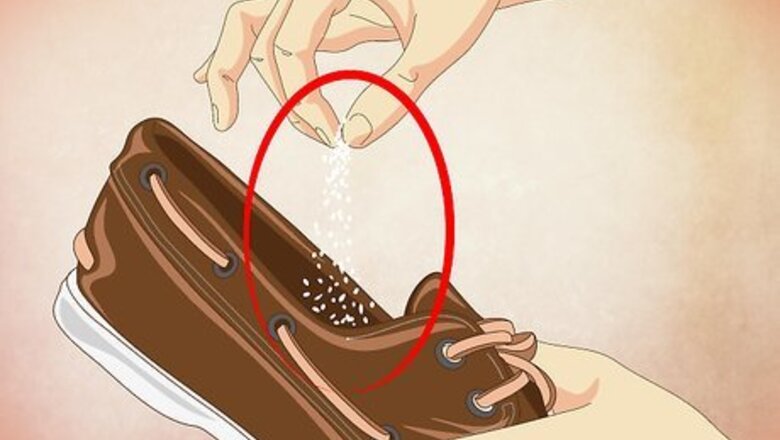
views
- Fill your shoes with common household items (like coffee grounds, cat litter, newspaper, or]] baking powder) that are effective at reducing odors.
- Grab a q-tip or cotton swab. Then, rub your shoes down with a disinfectant, like white vinegar or rubbing alcohol.
- If your feet cause lingering odors in most of your shoes, treat them. For instance, sprinkle talcum powder over your feet and socks regularly.
Quick Fixes
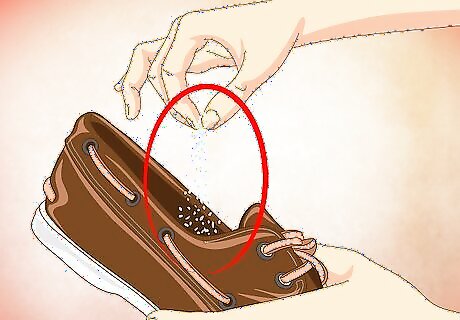
Sprinkle baking soda inside. This classic fix is famous for a reason — it works. Sprinkling about a tablespoon of baking soda inside a smelly pair of shoes will help absorb the odor and draw out moisture that makes it easier for bacteria to thrive. For best results, add the baking soda when you take the shoes off at night and shake it out before you put them on in the morning. You may want to avoid this for leather shoes — the baking soda can dry them out.
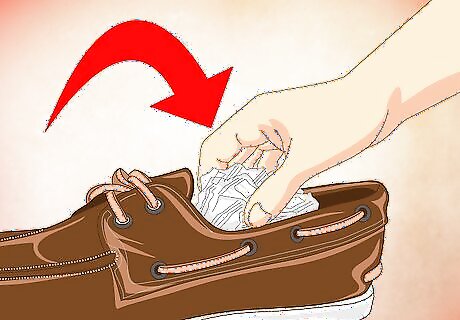
Stuff the shoes with newspaper. Instead of tossing yesterday's newspaper in the trash, recycle it with this odor-removal trick. Pack smelly shoes with bunched-up newspaper, then leave them in a dry spot to sit for several days. The newspaper will gradually absorb the odor and moisture from inside the shoes, leaving them fresh and new. You can also try sprinkling the newspaper with your favorite sweet-smelling perfume or aromatic. A few drops of vanilla extract can work especially well.
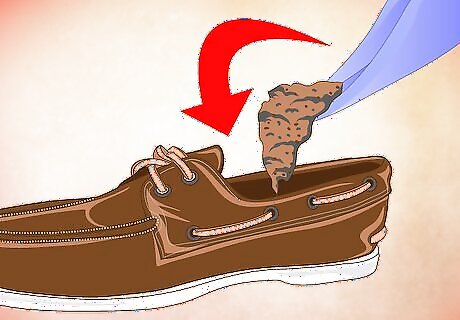
Try kitty litter. While it may not seem like the first thing you'd want in your shoes, kitty litter is designed specifically to neutralize odors, so it's actually a great choice. Spreading a tablespoon or two of (clean) kitty litter inside each shoe before you go to bed should greatly cut down on odor. Don't forget to shake your shoes into the trash in the morning!
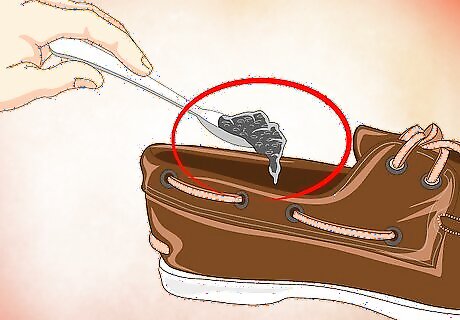
Try coffee grounds. If you're a coffee addict, make use of the leftover grounds you produce every day to fight shoe odor. Sprinkling a handful of dry grounds inside each shoe and letting them sit for a few hours is an excellent way to eliminate bad smells. Using dry grounds is crucial here — wet grounds will leave your shoes damp (which can make them smell worse before they dry out) and can stain the fabric of lighter-colored shoes. Coffee grounds also work well as a general-purpose odor remover. Try setting an uncovered bowl of dry grounds in the fridge. The results should be similar to what you'd get with baking soda.
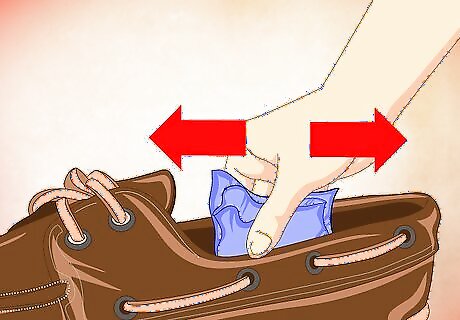
Rub with white vinegar. Swabbing the inside of each shoe with a rag or paper towel dampened with white vinegar is a great way to remove foot odors. Let the shoes dry completely before wearing them again — otherwise, you'll just replace the odor with the smell of vinegar. Stuff with crumpled up newspaper to help remove excess moisture if you use too much vinegar. Alternatively, try using vinegar along with the baking soda method above to create a fizzing foam that fills the shoe and removes odors. Stick to white vinegar here. Other varieties, like apple cider vinegar and balsamic, can stain your shoes.
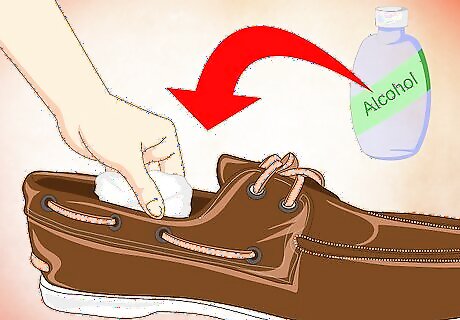
Swab with rubbing alcohol. Alcohol is a powerful disinfectant — it's great at killing a wide range of bacteria and other microorganisms. This makes it perfect for removing odor-causing bacteria from a pair of shoes. Soak a cotton swab or Q-tip in rubbing alcohol (also called isopropyl alcohol) and scrub the insides of your shoes. Be thorough, hitting every corner of the inside fabric and re-soaking your swab as needed.
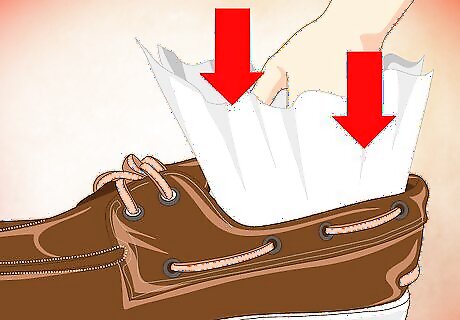
Use dryer sheets. These disposable laundry accessories are a cheap, convenient way to fight foot odor. Stuff one sheet in each shoe at the end of the day to remove odors overnight. For best results, be sure to use scented dryer sheets — unscented ones may absorb some of the bad odor, but they won't leave your shoes smelling as fresh.
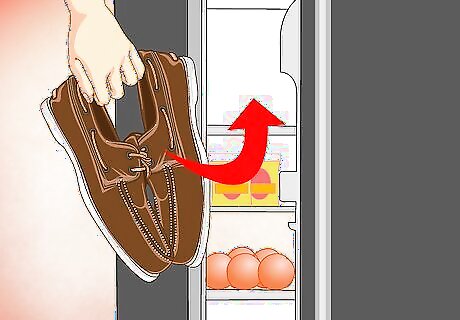
Freeze your shoes. According to some cleaning resources, this odd trick will leave your shoes smelling fresh once they come to room temperature. Leaving your shoes in the freezer overnight allegedly kills the bacteria that cause shoes to smell bad. Note, however, that some sources dispute this method.You may want to pair it with one of the other tricks above to be safe if you need good-smelling shoes.
Severe Odor
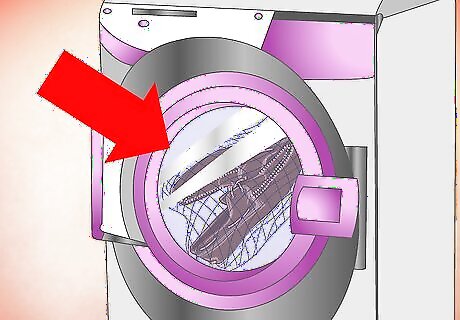
Run the shoes through the washer. When your clothes smell bad, you (hopefully) wash them, so why not use the same method for your shoes? For best results, remove the soles and laces from the shoes, then put all the pieces in a pillowcase or laundry bag to keep them together. Wash on warm or hot with your standard detergent. Repeat the wash cycle for especially-smelly shoes. If you can, let the shoes air dry in the sun. Not only will this expose them to plenty of fresh air so that they can "air out" — the sun also acts as a natural disinfectant for odor-causing bacteria. Note that this is not a good choice for shoes that can be damaged by water (like leather shoes).
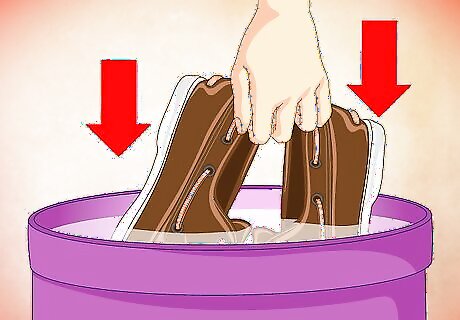
Use a disinfectant treatment. Shoes that have been exposed to sweat, moisture, and foot odor for years can have bacteria and fungi living deep within their fabric. To kill these organisms, a strong disinfecting soak may be necessary. This method uses bleach, so it's not a good choice for dark-colored shoes. You also won't want to use it for moisture-sensitive materials like leather. Follow the steps below: Soak the shoes in rubbing alcohol. Let it saturate the outside and inside fabric completely for about five minutes. Let the shoes air dry in the sun. If the weather isn't being cooperative, use a dryer set to low. Mix equal parts bleach and water. Put this mixture in a spray bottle and mist the inside and outside of each shoe carefully. Pull out the tongue, sole, and laces to make sure the spray gets everywhere. If you have an anti-fungal spray, use this like the bleach mixture. Otherwise, let the shoes air dry again before wearing.
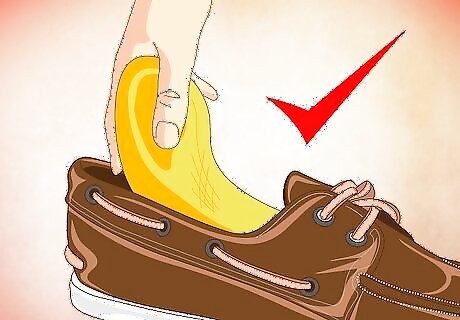
Get a new pair of insoles. If your shoes smell especially bad, you can try replacing parts of them to eliminate the source of the odor. A new set of insoles it probably the most effective thing you can buy. Insoles are sold as accessories at most of the same places where you might buy shoes and are usually fairly cheap. They can also feel great — many are made to provide extra comfort and support to people who spend lots of time walking or standing.
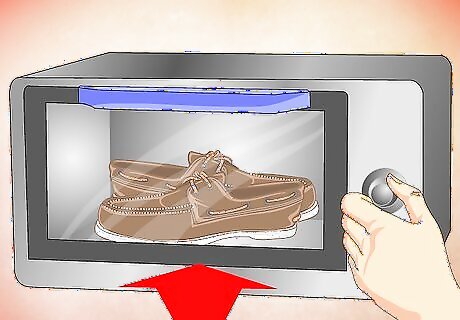
Carefully microwave to kill bacteria. Heat is a great way to kill bacteria — this is one of the reasons why meat is usually cooked before eating. You can heat your shoes in the microwave to kill bacteria, but if you do, you need to be cautious. Heating for too long can damage your shoes or the microwave itself. As with some of the methods above, this is not a good method for shoes made out of leather or water-sensitive materials. It should also not be used for shoes with metal pieces. Follow the steps below: Soak a rag in water. Rub the inside and outside of the shoe so that the material is damp all the way through, but not soaking wet. Put the shoes in the microwave. Remove the rotating plate if your microwave has one. Heat the shoes on high for 30 seconds. Stop and carefully check their temperature with the back of your hand. If they aren't hot, heat for another 30 seconds. Continue heating in 30-second intervals until the shoes are quite hot. Use a set of tongs to remove them and let them air dry.
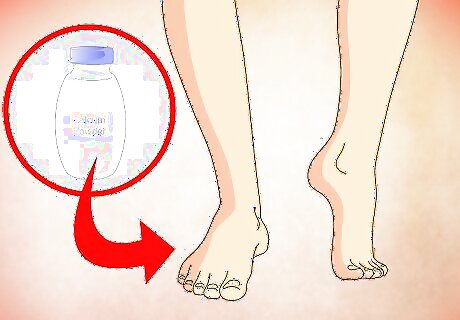
Treat your feet. A great way to get rid of smelly shoes is to fight the odor at its source — your feet. Keeping your feet as clean, dry, and odor-free as possible will make it much harder for your shoes to get smelly in the first place. One way to keep your feet fresh is to use talcum powder. Sprinkling a little on your feet and in your socks once you start sweating will help absorb moisture and prevent the bacteria that cause odors from forming. See our article on foot odor for more ideas.

















Comments
0 comment